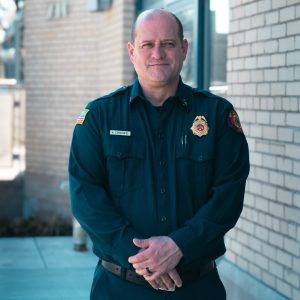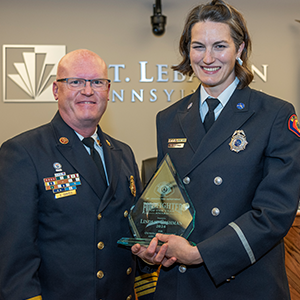Meet Mt. Lebanon’s new police chief

Jason Haberman is Mt. Lebanon’s new chief of police. He served as acting chief following Chief Aaron Lauth’s retirement in May, 2022, and was confirmed in the position by the Mt. Lebanon Commission in January.
Haberman has more than 25 years of law enforcement experience, beginning as a seasonal patrolman in Hanover Township, becoming a part-time and later full-time officer with the Edgewood Police Department, serving a stint with the Wilkinsburg Police Department followed by 14 years with the Port Authority of Allegheny County (now Pittsburgh Regional Transit) Police Department, before joining Mt. Lebanon as deputy chief in 2018. He also served as an EMT and firefighter with the Bower Hill Volunteer Fire Department.
As acting chief, Haberman took the lead in securing the department’s accreditation with the Pennsylvania Chiefs of Police Association. He spoke with Mt. Lebanon Magazine following his selection.
What made you choose a career in law enforcement?
As far as I can remember, law enforcement’s always been a calling for me. I was an Eagle Scout, and I feel like my moral compass had always pointed north, and I saw a career in law enforcement as a natural extension. I knew from an early age that I wanted to be in this profession.
How did you prepare for this job?
All of my experiences have shaped me for this role. I’ve never felt more prepared for anything.
Throughout my career, I’ve always looked for every opportunity to experience different things, to make my background more diverse. I was on a narcotics task force when I was with Wilkinsburg, got a lot of experience with narcotics and with violent crime. When I was with the Port Authority, I spent six years on a joint FBI task force that dealt with international terrorism. When Pittsburgh hosted the G20 summit in 2009, I was a mobile field force commander, coordinating transit officers and Department of Homeland Security personnel. We spent five months planning for the summit, and I cemented relationships with other departments and organizations that are still valuable.
I can’t emphasize enough how valuable those types of relationships are. In January, we sent officers to patrol Brackenridge and that area for a couple of weeks in the aftermath of the unfortunate line-of-duty death of their chief, to give their officers time to regroup.
What are the challenges you see in policing in the next decade?
I think the next era of policing is going to be very challenging, but it will be exciting to be a part of it. We have some great mentors here in the department. This is an opportune time for people to enter the profession, and usher in a new era. The challenge for us will be to show (prospective recruits) that it is a rewarding profession, while at the same time recognizing that the job is changing rapidly. We’re always going to need people to hold the line.
What are some of your top priorities?
The best quote I ever heard about leadership is, “The greatest privilege is to serve those who serve.”
I’ve seen the darker side of law enforcement—I lost a friend to suicide, and have seen some others die young. At Wilkinsburg, I was laid off for economic reasons, so I recognize fiscal responsibility and I’m aware of the effects layoffs have on employees and their families. Maintaining mental health is so critical; it makes for a better police officer, and that translates to an increased level of service.
Transparency and community engagement is another priority. As a lieutenant with the Port Authority, I worked with the Department of Justice and the U.S. Attorney’s Office, as we were tasked with working with young people following a high-profile shooting.
Here, we brought back the Coffee With a Cop program, and we started the Rock the Block public safety block parties, where residents could engage with police officers and other first responders in a fun and relaxed environment.
I want us to continue to engage with the community, identify what the community’s needs are and establish a social contract with the community.





